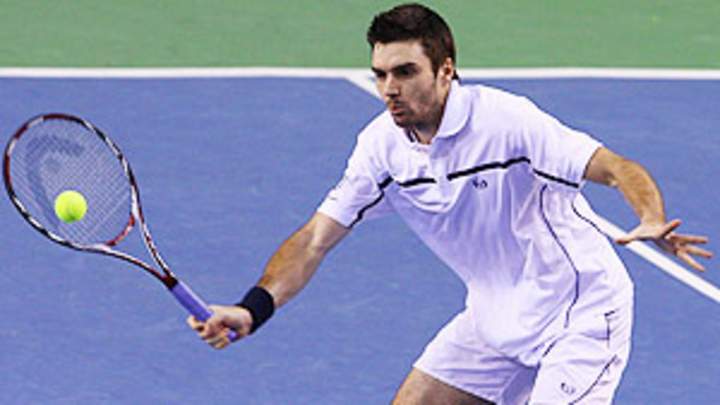Fleming fulfills potential with second turn on doubles tour

WIMBLEDON -- This time last year, Colin Fleming was working for the utility Scottish Power. An aspiring energy trader, he gazed out the office window at the first, inviting days of summer. Unable to ignore the itch, Fleming did what most young men and women can only dream of: he quit his job, traded his suit for his sneakers, and hit the lower levels of professional tennis. On Tuesday, the Scot will play in Wimbledon's doubles draw, capping a storybook rise up the rankings that included a victory two weeks ago against the No. 1 team in the world, the Bryan Brothers.
"It was a volatile period for energy prices," the 24-year-old Fleming remembers of his decision to go pro. "Oil was skyrocketing and energy prices were going up with it. I liked the job. But I remember looking around the office and thinking, 'this is fine, but I have a talent, I have an opportunity that won't last forever.' I realized I had to go, otherwise I'd regret it for the rest of my life."
Even in a sport as international and varied as tennis, Fleming's story is exotic. As an undersized, brainy 17-year-old, Fleming enrolled at Scotland's Stirling University without ambition to play professional tennis. After a growth spurt in his early twenties, he decided to go pro, leaving school after three years. But just as he was finding success as a doubles player, earning a wildcard to Wimbledon in 2006 as the doubles partner of Jamie Murray, the elder brother of world No. 3 singles player Andy, Fleming abruptly quit. He went back to university and earned a "first" in Economics from Stirling -- the British equivalent of summa cum laude.
"My first stint on tour, I just felt like I was floating aimlessly," Fleming explains. "I had no life outside tennis. So I figured it wasn't for me," he says.
There followed a period in which Fleming would go weeks without touching a racquet, and show up to amateur tournaments in Scotland and lose to middle- aged club players (disclosure: I played in many of these tournaments, and have stayed friendly with Fleming since that time). Fleming's coach, Euan McGinn of Stirling University, was exasperated. "He made a hero of many amateur players in Scotland who could say they beat a guy who played at Wimbledon. I talked to him about it: I didn't want him to be another player who didn't fulfill their potential. But I see now that the break was good for him. He's come back wiser."
Last fall, Fleming formed a doubles team with Ken Skupski, an English player who holds a degree from Louisiana State University. While the pair have used traditional, power doubles tactics to win four satellite tournaments together, their off-court activities are far from orthodox. While most tennis players pass the down-time between matches playing video games or checking up on sports scores, Fleming reads the business pages and remains regularly updated on his stock options. "Most guys on tour have only known tennis their whole life," Skupski says. "I'm not saying we sit around talking about politics and economics all the time, but it is refreshing to have an intellectual conversation with Colin."
In a sport in which only the top 50 doubles team in the world can expect to break even once travel and coaching expenses are taken into account, Fleming competes in an arena in which the only payoff to athletes is often being relieved of regrets. But even as he strives to answer the greatest "what if" of his life, Fleming rejects the role of jaunty amateur. He's hired a manager and put his father in charge of marketing. "There's a lot of love involved, I've loved every minute, but I'm also intent on making a living. I am looking after myself as a business," he says.
Even so, Fleming has been helped by the savings he accrued from his days in the office, and he admits that much of the pressure is lifted because he knows he can return to a successful career if tennis doesn't make him wealthy. While the money he won by beating the Bryan brothers, around $2,400, might not sustain him once he hangs up his sneakers for good, he can go back to work having experienced sport's sweet ecstasy at the highest level. "I can remember looking at the score board at 5-4 in the second set and realizing the scale of what was about to happen. We played one of our scrappier games, we maybe got lucky on one or two points, but once we won...it was the best feeling in the world."
